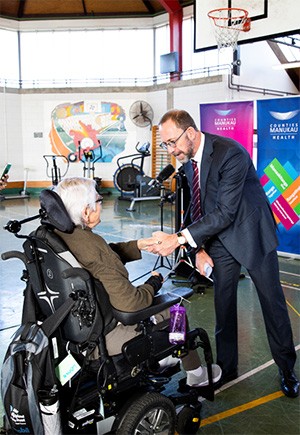Our future health system taking shape#
Hon Andrew Little, Minister of Health#

It's two months since I announced major changes to the way we deliver healthcare in New Zealand, and it has been positive to hear and see so many people across the sector engaged with the reforms and the opportunity they present.
We are making great progress towards transformational change to the health system.
What I've seen and heard across a range of recent forums and when meeting many of you is that this reform is long overdue.
Across the sector, people are sharing their enthusiasm for the most significant change to the health system in decades.
In recent discussions with senior clinicians, I was reminded that this is a once-in-a-lifetime opportunity to make meaningful long-term change and seriously address long-standing equity issues.
I am also hugely encouraged by the overwhelming response to the call for nominations for the interim boards of both the Māori Health Authority and Health New Zealand, with nearly 350 expressions of interest.
The interim boards will play a critical part in driving the vision of the reforms, by looking at every aspect of the existing system, services, workforce and infrastructure and thinking about how we can do better.
This reform is an opportunity to address not only the structure and way we deliver health services, but to also look at how we make the health system more sustainable.
Last month I spoke at the Sustainable Healthcare and Climate Health Conference Aotearoa, and said we had to make sustainability part of every decision we make. The health service is the largest public-sector source of carbon emissions, and we recognise that the challenge is a big one.
The establishment of Health NZ presents a unique opportunity to improve the collaboration, consistency and resilience across New Zealand to create a more sustainable and connected system.
The Ministry of Health, the Transition Unit and the new health entities will be working on ways the health system can meet the Government's carbon-neutrality goals, using the expertise and initiatives already happening across the country.
I am excited to see work progressing across a wide range of areas, for a better future in our health sector.
I encourage everyone to get involved over the coming weeks and months, as opportunities arise to help shape the future system through, for example, the development of the New Zealand Health Charter.
Ngā manaakitanga
Hon Andrew Little, Minister of Health
Strong response to interim board process#
Almost 350 applications were received during the expression of interest period for the interim Health New Zealand and Māori Health Authority boards.
The interim boards will help set up the way Health New Zealand prepares to run hospitals, commission primary and community services, and work in partnership with the Māori Health Authority to implement its unique role in the future system. The interim boards will also ensure the emerging arrangements are focused on delivering equity and better health outcomes for Māori and all New Zealanders.
The expression of interest period closed on Friday, 18 June. Approximately 175 people applied for a role on the Health New Zealand board, around 80 for the Māori Health Authority and 90 for both the Māori Health Authority and Health New Zealand boards.
The Minister of Health plans to confirm appointments to the interim boards in September.
Realising opportunities using digital and data#
Ministry of Health and the Transition Unit#
In the future health system, digital services will enable people to have more options and access to the care they need in their homes and communities. This is one of the ways our reforms can provide people and whānau with better access to quality care and services, no matter where they live.

The Transition Unit is working closely with Shayne Hunter, Deputy-Director General, Data & Digital at Ministry of Health (pictured) and his team, as well as the sector, to develop a forward view of the digital and data priorities for the system. This engagement with the sector will be ongoing as the reforms progress.
Emily Mailes, Lead Advisor – digital and data, for the Transition Unit recently presented at the MTANZ HealthTech Conference, to discuss the importance of technology and data in ensuring the success of the reforms. The future system will be better at connecting information and generating useful insights for clinicians to make better decisions about care, empower consumers to manage their own health, and for the system to operate more effectively and efficiently.
This will include a whole-of-system approach to technology and data. Health New Zealand will be the lead operational entity for digital and data capability and solutions, operating in partnership with the Māori Health Authority and supporting the Ministry of Health. Health New Zealand will invest in national, regional and local solutions, taking advantage of efficiency and scale where it can. This approach recognises the way community wellbeing networks will work in the future system and the need to support these care providers.
Some of the focus areas are:
- Transforming the consumer and clinician experience through digital technology and innovation. This means creating an environment where technology and solutions that can generate better health outcomes and efficiencies are identified, adopted and disseminated for the benefit of the system.
- Joining up data in the system so wherever people may turn up in the health system, health professionals will have all relevant information to provide the best possible diagnosis and care. There will also be a focus on using data better to support system performance monitoring, planning and policy development.
- Integrating Te Ao Māori in digital services at all levels and stewarding health information for betterment of people, whānau and iwi wellbeing.
- Digital inclusion to enable all New Zealanders to take advantage of the digital shift the health system is undergoing.
- Investing in digital and data infrastructure and people capability, so that the system can realise the high value of innovative solutions to improve health outcomes and reduce inequities.
Making strides on Pacific health#
Dr Api Talemaitoga and Dr Debbie Ryan#
The Pacific health team in the Transition Unit is growing, with the introduction of Dr Api Talemaitoga and Dr Debbie Ryan. The team will be working with the Transition Unit, Ministry of Health and the Pacific health community to progress the health reforms for Pacific peoples. Dr Colin Tukuitonga and Dr Corina Grey are also joining the Pacific health team and will be profiled in a future update.

Dr Api Talemaitoga is an Auckland-based GP, who has helped set up practices in both Christchurch and Manukau, Auckland, and is a distinguished fellow of the RNZCGP.
"I am proud to be involved in the health reforms to help shape a better future for Pasifika communities. Health data shows that despite a good level of interaction with the health system, Pasifika families continue to experience worse health outcomes than other New Zealanders. I am proud that we can bring together strong Pacific voices in the reforms so we can take control of the opportunity this brings. Pacific people have strong networks, and an opportunity to bring everyone together for a better healthy future. The innovation shown by Pasifika communities during last year's COVID-19 outbreak showed the strength and resilience they have to tackle a problem, when they are supported by good health advice and engagement led by Pacific providers and leaders of their communities. We need to embrace these ways communities are working together for better futures for our Pacific families."

Dr Debbie Ryan is the Principal of Pacific Perspectives, a Member of the New Zealand Order of Merit, medical practitioner, health services researcher and member of the COVID-19 Independent Advisory Group.
"I am optimistic about the potential the health system reforms bring for Pacific people. There is the opportunity to embed a deeper understanding of Pacific health and draw on learnings about how system structures and ways of working lead to the disparities in access, experience and quality of health services outcomes that have been reported for decades. It is an honour to bring together a group of experienced Pacific health experts to work as part of the Transition Unit, alongside Pacific health leadership at the Ministry of Health and the Ministry for Pacific Peoples, while also supporting the development of our future Pacific health leadership. The goal of the health system reforms is a good one, our work now is on making sure the implementation supports enduring and sustainable health system changes, that delivers for Pacific people."
Progressing community wellbeing networks#
The Transition Unit is carrying out an extensive information gathering exercise to capture current practice across the country that will help to shape future local wellbeing networks, also known as localities.
PHOs and DHBs have been asked to share examples of initiatives that are underway, planned, or that have previously been trialed, that can provide learning to support local wellbeing network development.
This discovery phase aims to identify initiatives that have been tried or are already in place that demonstrate the key features of planned local wellbeing networks:
- locality planning and needs assessment
- partnership with Māori
- involvement of Pacific providers
- community engagement
- cross-sectoral working
- integrated models of care or provider integration
- alliance arrangements
- data sharing, intelligence and governance.
More detailed discussions will follow with individual PHOs, DHBs, iwi / Māori providers and other key stakeholder groups to gain insight into good practice and emerging ideas and innovation, as well as those things that haven't worked so well.
This information gathering exercise will be followed by development of a process to select prototypes of local wellbeing networks which are expected to go live in early 2022.
